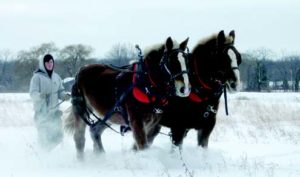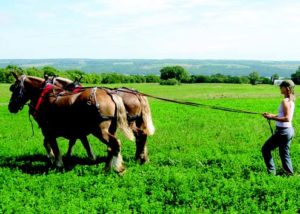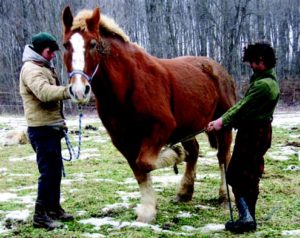The Best Tool in the Beginning Small Farmer’s Toolbox: Mentorship

Garrett drives Randy and Betsy on a practice run before heading for the more challenging stream crossing into the woods. Photo by Melissa Madden
Starting my own farm has provided me with all of the expected opportunities to manage everything from soil fertility to accounting. It is also a time for personal growth- to acknowledge my ideals and evaluate their strengths and weaknesses, to humble myself before the project at hand, and to form real ties with a vital community of small farmers. As a younger member of this community, I benefit from an upwelling of advice and support that is true mentorship. Scary decisions are simplified and realized under the guidance of experienced farmers- from horse farming to organic orcharding- and I can’t think of any other single thing that has more to do with shaping my young farm.
Starting Out: Young Farmers, Big Ideals
My partner Garrett Miller and I met through farming, setting in motion the wheels that, in 2008, delivered us to our own farm. Since we both desired to farm using permaculture principles, we needed guidance about applying these tools to the farm scale. In early 2007 we moved to Wisconsin to join Mark Shepard on his large-scale (100 acres) permaculture farm (New Forest Farm). There, while growing wholesale vegetables between Mark’s hazelnuts and chestnuts (alleycropping), we learned that 1) we COULD do it (farm by our ideals); 2) we SHOULD do it and 3) NOW is the time.
Three years later, Garrett and I are implementing the founding principles for our farm. Over the past winter we noticed a trend- each element in our plan also has one or more mentors to help guide us through our idealism. Looking at one of our big goals- “Energy Descent”- illustrates the impact of mentorship on our operation.
Horse Traction for Energy Descent

Melissa practices communicating with the team. Photo by Garrett Miller
Our Energy Descent goal is to import less off-farm energy every year. Farm traction represents a significant portion of on-farm energy use in most systems, and our farm plan is no different. From the outset, we understood our traction needs but were reluctant to solve these by purchasing a tractor. We decided to close this farm energy loop by farming with draft horses. Garrett and I have a combination of 7 years of farming experience, but prior to 2009 only Garrett’s yearlong stint on an animal-powered primitive farm had anything to do with horses.
Our draft power decision felt a little crazy, and without our friendship with horsefarmer Sara Brown (Earthly Mirth), we may not have gone that direction at all. After we purchased our land in 2008, I persuaded Sara to give us a series of draft power classes. For much of the following season, I borrowed tractors to do our fieldwork and we traveled to Sara’s for training. By the time we bought our draft team, I was only beginning to understand horse work, but I also knew that we had the support of people we respected.
We purchased an Amish-trained team in fall 2009 in order to spend the winter getting ready for the spring work. This early start helped us be relaxed and curious without the pressure of imminent fieldwork. Over the winter Sara taught us techniques for leading, driving and working. This was a great opportunity to learn to interact safely and productively with our Belgians.
By actually bringing home Randy and Betsy (our team) we gained another set of mentors. Farrier friend Eric Kincaid spent hours teaching us all how to pick up front and back feet for hoof trimming. Avid horse farmer Donn Hewes (Northland Sheep Dairy) volunteered to help us with both dominance and foot training at the end of this winter. In one March Sunday, Donn took my caution and turned it around to a greater appreciation for our horses. His teamster-honed skills made it possible for our horses to respect him rather immediately (something I struggled with for months), and gave me an opportunity to try on his attitude. I found that trying his lighthearted approach enhanced my own interaction with both horses, leading to safer and more fun training sessions to date. Thanks to this wealth of volunteered guidance, we are in the midst of an amazing first field season with Randy and Betsy, and we see our idealism going to work in reality.
Finding and Accepting Mentorship
Garrett and I came by our diverse set of mentors by accumulating them along our farming education path. For many start-up farms, an apprenticeship is time for the immersion and relationship building needed for long-term success. In 2005 I completed a season-long apprenticeship at Remembrance Farm, a 15-acre biodynamic vegetable farm, with Nathaniel Thompson. By staying in the area of my apprenticeship, I benefit from a community that knows me as an evolving farmer, opening floodgates of support.
Part of my joy in our rich community of supporters came after I acknowledged my need for guidance. When I left Remembrance Farm I wasn’t clear on what I needed to do next or how to ask for help figuring it out. Once Garrett and I purchased our farm, a completely new set of mentors helped us sort out details. At first, we knew about our high tunnel mentors at Sweet Land Farm but were intimidated by their experience. We actually joined Sweet Land’s CSA before we got to know the farmers, Paul and Evangeline. Once I overcame my self-consciousness, I realized that experienced farmers felt kinship with us that made offering mentorship natural. Since Evangeline invited me over for our first mid-winter farm planning session, I’ve found myself over there almost every week. I certainly didn’t start with such ease in accepting advice, but came to it through a humbling recognition of my own ignorance.
As a beginning farmer, I benefit from advice in direct proportion to my awareness of the largess of my project and my willingness to ask for help. The more I humbly ask and immerse myself in available resources, the more I find help most everywhere I turn. I believe THAT is the sign of a vibrant agricultural community.


